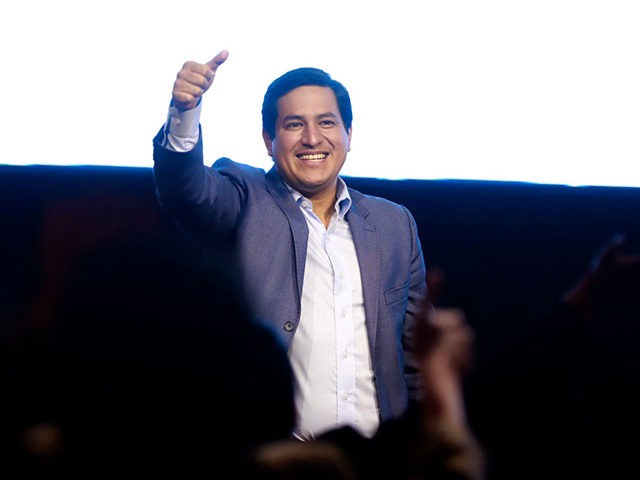Leftist candidate Andrés Arauz won the first round of Ecuador’s presidential election on Sunday, and will likely face fellow leftist Yaku Pérez in the runoff vote, after denying a bombshell report claiming the National Liberation Army (ELN), a Colombian Marxist terrorist group, funded his campaign.
Arauz and Pérez are vying to replace outgoing president Lenín Moreno, who is leaving office due to term limits. During Moreno’s tenure, Ecuador amended its constitution to reduce the permissible time for any one president from two four-year terms to just one, largely considered an attempt to keep socialist former president Rafael Correa from running again. Moreno won the presidency with Correa’s endorsement but spent much of his tenure undoing Correa’s destructive policies, from divorcing Ecuador from the socialist regime in Venezuela to issuing a warrant for Correa’s arrest over questionable business dealings with China.
Arauz, like Moreno, is a former protege of Correa’s and considered his hand-picked choice of successor. Correa has been openly campaigning for Arauz online from his adopted home in Belgium, where he has lived since his tenure as president ended in 2017. As an Ecuadoran court convicted him on criminal corruption charges, Correa has chosen not to return home and serve his sentence. He nonetheless remains extremely influential on the Ecuadoran left. Arauz has referred to Correa as a victim of “political persecution,” hinting he may pardon the former president.
Ecuador’s National Electoral Council (CNE) revealed in the early hours of Monday that Arauz had won the first round of the election, against 16 other candidates, with 32.21 percent of the vote. As he did not reach the 50-percent threshold to avoid a runoff election, he will face the second-place candidate again in April.
Determining his opponent took several more hours as the second-place candidate, Pérez, obtained 19.78 percent of the vote while the third-place candidate, conservative economist Guillermo Lasso, received 19.61 percent of the vote, with 97.46 percent of votes counted. The vice president of the CNE, Enrique Pita, described the tally as a “technical tie” on Monday, given the margin of error, while both candidates claimed victory. The Agence France-Presse nonetheless projected Pérez would keep his second-place position as of Monday afternoon.
Arauz campaigned largely against Lasso, who lost and claimed to be a victim of voter fraud against the incumbent Moreno.
“Resounding victory in all the regions of our beautiful country. Our victory is a two-to-one [margin] against the banker,” Arauz wrote on Twitter, referring to Lasso.
Arauz will likely have to recalibrate his campaign significantly when campaigning against only Pérez, an attorney and candidate for Pachakutik, the political wing of the Confederation of Indigenous Nationalities of Ecuador. Pérez is running on an environmentalist, pro-ethnic minority leftist platform. As candidate, Pérez promised to bring in a new wave of politicians with no establishment ties and to fight corruption, a campaign that would remain coherent if run against Correa’s choice.
That Lasso will likely not appear in the run-off means Ecuadoran voters will have to choose between two far-left candidates. Pérez’s anti-corruption stance may also mean the return of questions surrounding Arauz’s ties to the ELN, a Marxist guerrilla. The Colombian magazine Semana published a report in late January alleging that ELN terrorist leader Andrés Felipe Vanegas, known as “Uriel,” had invested significant guerrilla funding into the Arauz campaign. Semana claimed that it had received access to computer documents and messages from Uriel’s personal computer in which Uriel claimed that the ELN had invested at least $80,000 into “the allies,” which allegedly was a reference to Arauz.
Uriel died as a result of a targeted Colombian military operation against him in October, leading many to suspect that Colombian law enforcement sources may have collaborated with Semana to expose the contents of his personal computer. Conservative Colombian President Iván Duque noted in his announcement of Uriel’s death that he “was responsible for crimes such as the kidnapping and killing of social leaders, persecution and threats, … the killing of soldiers and police officers, and … encouraging the recruitment of minors.”
The ELN issued an official statement to Semana denying any ties to Arauz.
“[I]n the last week the intelligence agencies of the Colombian state have spread false news, in which they present us as if we were interfering in the internal affairs of Ecuador,” the statement read in part. “We reject that the government of Ivan Duque encourages this information war to interfere in the election process underway in neighboring Ecuador.”
Arauz has also adamantly denied any ties to terrorist organizations.
Moreno, asked about the report, told Semana that he did not believe Duque would interfere in bad faith with the Ecuadoran presidential election. Asked if he believed it was possible for Rafael Correa to have ties to the ELN, he said, “I don’t doubt it.”
Moreno was once Correa’s vice president and ran on a socialist platform to succeed him. Almost immediately after becoming president, however, he turned against Correa, stating that he was now privy to scandalous information regarding Correa’s alleged corruption and mismanagement. Under Moreno, Ecuadoran police issued an arrest warrant for Correa and ultimately convicted him of corruption charges. Among the accusations against Correa were that he paid kidnappers to abduct political dissidents and that he offered China lucrative deals on Ecuadoran oil that significantly damaged the nation’s economy.
Moreno also took several steps to undo other damaging Correa policies like offering Wikileaks founder Julian Assange citizenship — despite Assange never stepping foot in Ecuador — and cutting ties with Venezuelan dictator Nicolás Maduro, who Moreno has referred to as an “ass.” Moreno’s administration also limited presidents to only one term in power, preventing Correa from returning to the helm of the country even with a potential pardon.

COMMENTS
Please let us know if you're having issues with commenting.